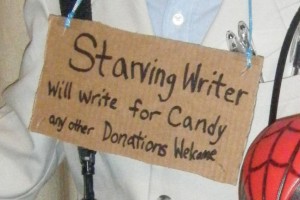Craft
Writing & Money

I sometimes think writers have a different relationship to money than other people. It’s the odd work-wage equation that changes things: you can easily find yourself toiling for no pay for decades, falling into a life of monk-like asceticism with diminishing expectation for salvation at the end of the line. Writing becomes like a protracted prayer — for recognition, or at least a wise, understanding reader who exists as a kind of imagined angel. In Enemies of Promise, his book about the myriad ways in which a writer can fail, Cyril Connolly admits that poverty is devastating, but adds that having money to throw around can be “a substitute for creation.”
Conversation among writers more often than not revolves around the subject of agents and advances. The name of a magazine comes up, and the first question is: how much do they pay? They sound like a group of salesmen, insisting on a materialism that we don’t really possess, as if to trick themselves into believing that the profession is like any other. The shop talk is a way of fending off our anxiety about a livelihood that constantly seems at the point of disappearing. On occasion, the pursuit of money is put forth as the only reasonable motive to write, an absurd bit of bravado that we all know to be untrue. Norman Mailer once told of being approached by a stockbroker after the success of his first novel The Naked and the Dead. Mailer handed him $10,000 to invest. Less than a year later, the broker informed him that the value of the investment had almost doubled. Mailer cashed in the account, and refused to retain the broker. “I thought, if it’s this easy to make money I’ll never write again.”
Having a cushion of inherited money brings its own set of problems, not the least of which is the resentment it incurs, queering the fellowship hard-up writers depend on to help them through lean times. The poet James Merrill, whose father was a founder of the brokerage company Merril Lynch, navigated the touchy subject of his wealth by creating a foundation that gave grants to writers. “Cleverly, Merrill had figured out that if he wanted to spend time with other poets rather than bankers, he needed to share the wealth without making it look like handouts,” Edmund White writes in his recent memoir City Boy: My life in New York during the 1960s and ’70s, “If a friend put the touch on him, Jimmy could always say, ‘Apply to the foundation, but remember I’m just one of the board members.’” Everyone knew Merrill had the final say, but the set-up served its purpose. “If someone got money from the foundation, he or she didn’t have to feel beholden to Merrill himself. Nor was it a loan that had to be paid back — or that could potentially create bad blood…”
A well-heeled novelist I know who comes from a family of famous industrialists complains of the American romantic notion that money is inimical to the creation of art. He’s only half-joking when he says, “I’ve had a hell of a time overcoming my advantages.” He claims that the family fortune had been dissipated by his parents. “What I’m really like is the poor schmuck who inherits a twelve-bedroom house that he can’t afford to heat or repair.” In fact, he would discreetly make substantial loans to his friends. Several years ago he bailed me out of a mess, apologizing that he couldn’t afford to give me more. “Things are a little tight, you know.” He seemed irritated when I tried to pay him back, and never cashed the check.
Having to explain the chasm between your ambition and low status can grind you down, especially when it lasts into your forties. Edmund White ghostwrote textbooks for three hundred bucks a chapter. He worked for a petrochemical company preparing glossy annual reports designed to explain to shareholders why the company continuously lost money. White was grateful to a friend for understanding how brave he was going out into the world and meeting well-known writers even though he was not yet “armed with a single publication.”

Sherwood Anderson’s collection of stories, Winesburg, Ohio, kicked around for four years before he found an interested editor. The editor summoned Anderson to New York and arranged to meet him at a certain corner near Central Park at four. Anderson arrived and waited. He was still waiting at six, when he gave up and returned to his hotel, seeing it as some kind of sadistic trick publishers enjoyed playing on hopeful authors. In his Memoirs Anderson wrote: “I went to my hotel and threw myself on the bed…tears flowing from my eyes. It all seems silly now but on that evening I was really more desperate than I had ever been before in my life.” Most writers recognize this particular brand of despair. To be told “It’s only a book,” as I was when in the midst of a seven-year heartache over my first novel, is like telling a lovesick adolescent “There will be others.” At nine that same night, the editor called Anderson. They had been waiting on different corners. He wanted to publish the stories. Anderson expresses no pleasure at this turn of events, only a vague feeling of relief, a perfect illustration of Epicurus’s definition of happiness as simply the absence of pain. For Anderson, pain wasn’t absent for long. When Winesburg, Ohio was published, in 1919, “in review after review it was called ‘a sewer’ and the man who had written it taken as strangely sex-obsessed…a kind of sickness came over me, a sickness that lasted for months.”
I might have had an easier time of it during the long apprenticeship years had I listened to my father, who, seeking to protect me from a future of hardship that he saw more clearly than I did, urged me to get a university degree. “At least you’ll be able to teach while making your bones as an author,” he said. My concept of what being a writer would entail was so unformed that I took his well-meaning advice as a typically philistine insult. Teaching sounded like a prison sentence that I might never finish serving. What I really doubted, I think, was my ability to lead a double life, writing secretly on weekends. According to Connolly, excessive isolation is one of many traps the writer should take pains to avoid. Having no one to talk to can distort your work, but talking about it too much can kill it. In retrospect, I see I first had to announce my ambition in a brazen way in order to begin to believe in it myself. Now, like most of my writer friends, I pretend that I believed it was a viable profession all along.
– Michael Greenberg is the author of Beg, Borrow, Steal: A Writer’s Life and the award-winning memoir Hurry Down Sunshine. Visit his website at www.michaelgreenberg.org.








